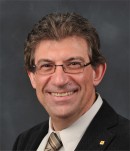

Plenary Lecture
Ni-Doped Carbon Nanofilaments: Preparation and Use as Steam Reforming Catalyst

Professor Nicolas Abatzoglou
Co-author: Carmina Reyes Plascencia
Université de Sherbrooke, 2500 Boul. Université
Sherbrooke (Quebec) J1K-2R1,CANADA
Email: Nicolas.Abatzoglou@USherbrooke.ca
Abstract: The use of Single (SWNT) and multi-wall (MWNT) carbon nanotubes (CNT) as heterogeneous catalyst supportsis being studied at significant extent since the late ‘90s. The main advantage offered by these nanostructures is the possibility to have well dispersed and thermally stable catalysts. Although the results are encouraging, the relatively high cost of the CNT compared to conventional ceramic supports constitutes a major hurdle towards commercialization.
Previous work of our research group (a) has driven to a patented process for the production of much less expensive carbon nanofilaments (CNF) and (b) has proven that these CNF have by themselves, without any subsequent preparation, catalytic properties in ethanol dry reforming due to their low content in iron carbides.
The main objective of this work is the use of the so-produced CNF as support of diesel steam reforming catalysts.
The methodology include (1) functionalization of the CNF through an optimized acid pretreatment; (2) use of the functionalized CNF as support of a Ni-based nanocatalyst by means of a wet impregnation technique; (3) prove the catalytic activity of these new nanostructures and (4) optimize the steam reforming conditions and (5) compare with known catalysts.
An isothermal fixed-bed reactor, equipped with a proprietary water-diesel emulsion formula injection train, on-line sampling + GC analysis and a data acquisition and control interface, has been operated under steam reforming conditions.
The CNF -during all experimental steps- as well as the therefrom produced fresh and used reforming catalysts are analyzed by many instrumental techniques: Scanning and Transmission Electron microscopy (SEM and TEM) to visualize the morphology and map the elemental composition;Inductively Coupled Plasma-Atomic Emission Spectroscopy (ICP-AES) to evaluate the metals (Ni) load;X-Ray Diffraction (XRD) to evaluate the presence and changes of the crystalline (and amorphous) phases.
The preliminary results are very promising and the details will be available in the full paper and the invited lecture.
Brief Biography of the Speaker: Dr. Nicolas Abatzoglou is full professor and Chairman of the Department of Chemical & Biotechnological Engineering of the Université de Sherbrooke. He is also Adjunct Professor at the University of Saskatchewan, Department of Chemical Engineering. He is a specialist in Process Engineering involving particulate systems in reactive and non-reactive environments. Since May 2008, he is the holder of the Pfizer Industrial Research Chair in Process Analytical Technologies (PAT) in Pharmaceutical Engineering. He is Director of the Research Center on Energy, Environment and Green technologies & Processes (GREEN-TPV).
He is co-founder of the company Enerkem Technologies Inc., a spin-off of the Université de Sherbrooke. Enerkem commercializes technologies in the field of energy from renewable resources (i.e. biomass and waste streams gasification; cellulosic ethanol).
He has a career of many years at both the academic and industrial levels. He represented Canada at the International Energy Agency (Gasification Task) from 1997-2001 and was the secretary of the Board of Directors and the Executive Committee of the AQME from 1996-2000. His research activities during the six last years are:
Steam and dry reforming of methane, ethanol, diesel and biofuels.
New Fischer-Tropsch Synthesis nanocatalytic formulations for the production of Biofuels (Green Diesel and Higher Alcohols) from biosyngas and biogas.
Process Analytical Technologies (PAT) in Pharmaceutical Engineering
Carbon sequestration through CO2 (dry) reforming.
Biogas purification using granular adsorbents.
His production as a researcher includes a hundred of publications in scientific reviews, international conferences, plenary and invited lectures, patents and a book chapter. He currently supervises or co-supervises 10 graduate students and 3 undergraduate students in specialty projects or training sessions. His professional experience as engineer spreads over a dozen of years. He is member of the BioFuelNet (national coordinator of the thermal conversion Theme) and SOFC Canadian Networks. He has received many distinctions and awards both for his teaching and research achievements.
Prof. Abatzoglou is trilingual (French-English-Greek).